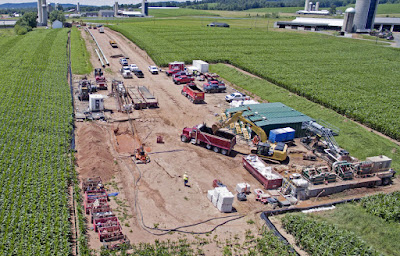On June 30, the U.S. Courts of Appeals for the D.C. Circuit ruled the Federal Energy Regulatory Commission (FERC) cannot indefinitely delay their review of complaints by landowners who wish to protect their property from natural gas and oil pipelines, among other infrastructure developments.
In 99 percent of the requests for rehearing of pipeline certification decisions received by FERC between 2009 and 2017, the agency used tolling orders to prevent the aggrieved party from being able to timely challenge FERC’s certification in the courts.
And during this delay, pipeline companies were able to rely on FERC’s certification to start construction.
The case included a Lancaster County example where two homeowners protested a pipeline company’s (Transco) application to construct a pipeline in the middle of their land. After FERC issued a certificate to Transco, the company began eminent domain proceedings and was soon granted court permission to proceed.
Once FERC approves a pipeline, the pipeline company can immediately exercise eminent domain and take land for construction while the pipeline’s opponents must file a request for rehearing with FERC before appealing to a federal court.
Noting that use of these tolling orders to “stall judicial review” was “virtually automatic” by FERC, the D.C. Circuit recognized that the use of these orders “has real-world consequences” that are detrimental to landowners whose property is being condemned by pipeline companies.
The decision strikes down FERC’s delay practice and requires the agency to make a decision on rehearing requests within the 30 days required by law.
Click Here for a copy of the opinion.
Reaction
In response to the court’s decision, PennFuture Vice President of Legal & Policy Abigail M. Jones has issued the following statement:
“PennFuture is encouraged by the court’s decision to end this long standing abuse by FERC that strips our communities of their day in court and leaves our lands vulnerable to condemnation and destruction.
“The pipeline companies will no longer be shielded by the systematic and egregious delay that has benefited them for decades. This decision gives landowners, environmental groups, and environmental justice communities who are disproportionately burdened by pipeline infrastructure back our right to challenge FERC’s decisions before the irreparable harm from pipeline construction can occur.”
Maya van Rossum, the Delaware Riverkeeper and leader of the Delaware Riverkeeper Network, said this in a statement--
“We are pleased that the court recognized the injustice in FERC’s twisted logic that a Certificate Order can be final for the purposes of condemning property, yet non-final for the purposes of judicial review.
“The use of tolling orders to place challengers in legal limbo while pipeline companies use the power of eminent domain to take property rights and get permission from FERC to inflict irreparable harm on the environment has been routine practice by FERC.
“The end result of tolling orders has been that by the time we get our day in court, it is simply too late, the damage is done and there is no meaningful remedy, as shown by our 2014 challenge of the Tennessee Gas Northeastern Upgrade Project the court cited in its opinion.
“The fact that the courts, up until now, have given FERC legal authority to rob people of their rights in this way is unconscionable – it was past time for the courts to reconsider the precedent they have set on this issue and to stop the abuse of tolling orders by FERC.”
Related Article:
[Posted: June 30, 2020] PA Environment Digest






